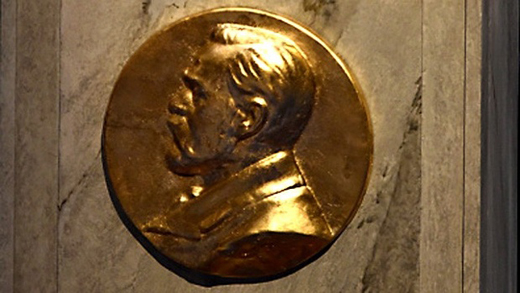Tunisian group wins 2015 Nobel Peace Prize
Mangalore Today News Network
Oct 09, 2015: The Norwegian Nobel Committee on Friday bestowed the Nobel Peace Prize on an alliance of four Tunisian civil society groups for their tireless efforts to seek harmony and foster democracy in the nation that gave birth to the Arab Spring.


The quartet of groups, including a worker’s union with more than 1 million members, has worked to advance democracy in Tunisia, which has made relative strides in reforms as other Arab Spring nations struggle with greater violence, instability and the re-emergence of dictatorships.
The groups, the committee said, made a “decisive contribution to the building of a pluralistic democracy in Tunisia in the wake of the Jasmine Revolution of 2011.”
“More than anything, the prize is intended as encouragement for the Tunisian people who have laid the groundwork for a national fraternity which the committee hopes will be followed by other countries,” the committee said.
The National Dialogue Quartet comprises four key organizations in Tunisian civil society, including the Tunisian General Labor Union, the Tunisian Confederation of Industry, Trade and Handicrafts, the Tunisian Human Rights League and the Tunisian Order of Lawyers. But the award also seemed to more broadly honor a nation where the Arab Spring began after street vendor Mohamed Bouazizi set himself on fire on Dec. 17, 2010 to protest his helplessness after his wares were confiscated by local authorities.
Houcine Abassi, secretary general of the labor union, told The Associated Press, the group was “overwhelmed” by the Nobel selection.
“It’s a prize that crowns more than two years of efforts deployed by the quartet when the country was in danger on all fronts,” he said.
“I am happy,” he said, adding that the quartet members weren’t expecting the prize.
He described how the UGTT, a human rights group, a trade group and a lawyers group joined together to try to “bring the country out of crisis.”
What followed was an difficult struggle for political openness that in Tunisia that has remained more on track than anywhere in the region despite being scared by political violence and terror attacks by religious extremists.
While the nation remains vexed by complex challenges and divisions, it nevertheless offers a far more successful outcome than the Arab Spring brought to a bevy of other nations including Libya, Egypt and Syria.
- Special train between Indore and Mangaluru to clear festive rush
- Land owners demand denotification of lands notified for highway widening in Padua village
- Daiva ritual linked to Rishab Shetty’s vow conducted as per tradition, shrine committee clarifies
- Mangaluru: Youth found dead by hanging at Padil
- Vande Bharat Express likely from Bengaluru to Mangaluru, Udupi and Karwar
- Kasaragod: Local body election results to be announced today
- Udupi: Skeletal remains of unidentified man found in Ambalpady
- Uppinangady: Wild elephants destroy crops in Bajathoor village
- Sullia youth killed in hit-and-run in Mysuru
- Union Cabinet announces Census 2027, to be held in two phases
- Mangaluru: Illegal cattle slaughter continues, three carcasses found near riverbank
- Hejmady Kodi fishing harbour project sees 87% progress, says Union Minister quoting Karnataka government
- Belthangady: Shop owner booked under POCSO for sexual harassment of minor girl
- Ex-Air Force officer arrested in Assam on charges of spying for Pakistan
- 2001 Parliament attack anniversary: PM Modi, Rahul Gandhi pay tribute to fallen heroes
- Lionel Messi’s blink and Miss Kolkata event angers fans, bottles thrown
- 3 US lawmakers move resolution to end President Trump’s 50% tariffs on India
- Bengaluru man electrocuted while trying to save pet parrot worth 2.5 lakhs
- Red fort blast: Delhi court sends 3 doctors, preacher to 12 days jail
- Samajwadi to Majawadi: BJP slams Siddaramaiah on flight travel expenses
- IndiGo crisis: DGCA suspends 4 Flight Operations Inspectors
- Former Lok Sabha Speaker Shivraj Patil dies At 90
- Indian artefacts among 600 high value items stolen from UK museum
- Andhra bus with devotees crashes into ravine due to heavy fog, 9 dead
- IndiGo offers travel vouchers worth Rs 10,000 to passengers severely impacted during Dec 3-5
- Mangaluru Student Goes Missing; Ullal Police Register Case
- APD Foundation Joins WHO Civil Society Commission
- Daiva’s prediction comes true: Janardhan Reddy walks free from jail
- Skills and Competencies Take Center Stage at MSN Dialogue Series
- Court remands Maoist Lakshmi to six-day police custody
- Sandhya Shenoy honored with Society for Materials Chemistry Medal-2024
- White Cornus Apartment in Mangaluru
- City girl wins first place in state-level spell bee competition
- Alleged ‘Love Jihad’ Case in Mangaluru: Woman left home voluntarily, says police
- Girl fatally struck by reckless two-wheeler near Belman
- New residential complex for the judges inaugurated in Mangaluru
- Absconding accused nabbed after 8 years
- Truck with cylinders turns turtle in Beltangady
- Bhoota Kola artist dies of cardiac arrest
- Development of the country should be our goal: Ganesh Karnik
- CITY INFORMATION
- TRAVEL
- TOURIST INFORMATION
- HEALTH CARE
- MISCELLANEOUS




 Write Comment
Write Comment E-Mail To a Friend
E-Mail To a Friend Facebook
Facebook Twitter
Twitter  Print
Print 

